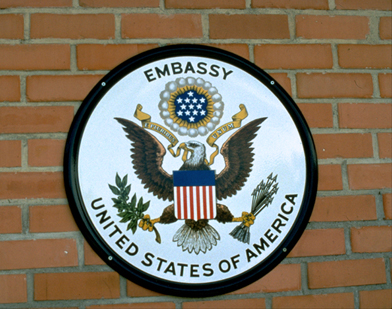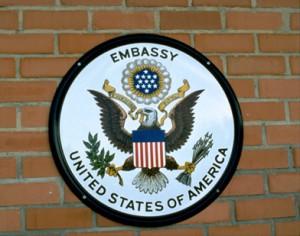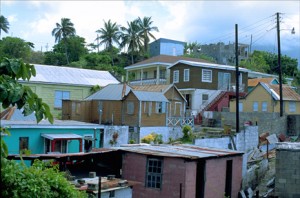Bill proposes 5 new U.S. embassies in Eastern Caribbean


A bill calling for the establishment of U.S. embassies in five Eastern Caribbean countries faces an uphill battle in Congress due to budget concerns as well as general apathy. (Credit: Larry Luxner)
WASHINGTON — Later this week, on his way to the Summit of the Americas in Panama, President Obama will meet with the leaders of all 15 members of the Caribbean Community (Caricom) in Kingston, Jamaica.
Yet the United States lacks a diplomatic presence in one-third of these countries.
Legislation introduced in late March by Rep. Eliot L. Engel (D-NY) aims to change that. His bill, the U.S.-Caribbean Partnership Act, would establish new embassies in five English-speaking island nations: Antigua & Barbuda, Dominica, St. Kitts & Nevis, St. Lucia, and St. Vincent & the Grenadines.
Engel, who originally submitted the measure in the 113th Congress, is the leading Democrat on the House Committee on Foreign Affairs, and a former chairman of the Western Hemisphere subcommittee.
“Just as you can’t conduct diplomacy from a bunker, you can’t conduct diplomacy from hundreds of miles away,” said Engel, who’s 16th District covers parts of the Bronx and Westchester County. “My bill would strengthen diplomatic ties with our Caribbean neighbors so that we can work even more closely on a range of issues, from promoting economic development and combating drug trafficking to our shared work through the OAS [Organization of American States].”
At present, the U.S. Embassy in Bridgetown, Barbados, handles all diplomatic and consular affairs with the five countries. But that, says Engel, “presents challenges for conducting in-person diplomacy” and providing full consular services for U.S. citizens living on these islands.
“The United States must fly diplomats to these locations at great difficulty and expense just to conduct face-to-face meetings,” said the congressman, whose bill is co-sponsored by eight Democrats (including four from Florida) but not a single Republican — making its passage in the Republican-controlled House doubtful.

Coconut palms sway in the breeze at Jumby Bay, Antigua — one of five Eastern Caribbean nations that would get a U.S. Embassy for the first time if a bill submitted by Rep. Eliot Engel (D-NY) becomes law. (Credit: Larry Luxner
Proposal makes ‘perfect sense’
Nevertheless, John Maisto, who was U.S. ambassador to Venezuela from 1997 to 2000 and is well versed in Caribbean affairs, said Engel’s proposal makes perfect sense.
“Eliot Engel is one of the smartest men in Congress when it comes to foreign policy. The fact that the United States lacks full-blown embassies in the Caribbean sends the wrong message,” he told NIMB. “When China and Venezuela can have more embassies in our immediate neighborhood than we do, that says something about the ability of the United States to focus. Both political parties are responsible for this.”
Maisto added: “We’ve always put an emphasis on countries with larger populations, and the smaller countries seem to be the first ones to be cast aside. If we cannot have full-fledged embassies, it should be possible to have at least some sort of serious diplomatic presence.”
La Celia Prince, St. Vincent’s ambassador to the United States, said her government fully supports the bill.
“There is no substitute for getting to know and understand a country, its government and people, and building trust, than through direct diplomatic channels,” she told us, noting “gaps in communications lines” between St. Vincent and the U.S. Embassy in Barbados, despite the embassy’s best efforts.
“That becomes quite evident when we see some of the annual reports which are presented by the U.S. each year, such as the Department of Justice report on human trafficking, and the Department of Labor report on child labor. It is diplomacy at a distance; we would welcome the U.S. presence.”
Of particular benefit would be the establishment of an embassy in Kingstown, St. Vincent’s capital, complete with consular services, she said.
“At the moment, every person applying for a U.S. visa has to appear in person at the U.S. Embassy, which means undertaking air travel to Barbados,” said Prince, whose country has about 110,000 people spread across 32 islands and doesn’t even have its own international airport yet. “This is extremely costly to our citizens.”

Wood-and-zinc houses crowd a hillside outside Basseterre, capital of the twin-island republic of St. Kitts & Nevis — smallest independent nation in the Western Hemisphere. (Credit: Larry Luxner)
‘We feel excluded’
Hubert Charles, Dominica’s ambassador in Washington, agrees.
“At times, we feel excluded from the thrust of U.S. diplomatic outreach,” said Charles, whose island is home to 73,000 people. “Other countries like Brazil and Canada have found it possible to establish facilities in our small Eastern Caribbean states. The bottom line is, we’re sure the U.S. can find cost-effective options to do so as well.
By any measure, the five countries in question are tiny. The largest of them, St. Lucia, has a population of 172,000 — about the same as Ponce. And only 46,000 people live on St. Kitts & Nevis, making the twin-island republic the smallest independent nation in the Western Hemisphere.
Altogether, the five countries comprise just over 1 percent of the Caribbean’s total population of 43 million.
“It’s not even half a million people spread over all these islands. The cost per-capita would be prohibitive,” said one critic, a Washington-based Caribbean consultant who called Engel’s legislation just plain stupid. “I see no value in this idea. I know it’s a bit of an inconvenience for people in those islands to have to travel to Barbados [for visas], but I’m a taxpayer and we don’t have money for this.”
The consultant, who asked not to be named, said Engel has been pushing this idea for years.
“There’s a reason why it never gets anywhere. This is all because he has such a large population of West Indians in his district,” he said. “And I’ve never seen public statements by anybody from these islands saying this is a great thing.”
Yet Engel claims the five new U.S. embassies wouldn’t cost taxpayers a dime, because it would reassign Foreign Service officers from Iraq and Afghanistan to staff the new embassies. Currently, the enormous U.S. Embassy in Baghdad has more than 500 such officers, and the U.S. Embassy in Kabul another 300 or more — but both those missions are being scaled back as American troops withdraw from those countries.
Under Engel’s proposal, when 20 percent of the diplomats in these two war-ravaged countries come home, only five would be reassigned to the Eastern Caribbean.
Countries should not be overlooked
In an op-ed in the Miami Herald, the lawmaker pointed out that while the five English-speaking countries are small, they cannot and should not be taken for granted.
“They are key voting members of the United Nations and other international organizations [such as] the OAS — the only political organization in the Americas that actually includes the United States,” he said. “With democracy under attack in the hemisphere, it is important that we work with our partners in the Caribbean to ensure that the next OAS secretary general is willing to protect these fundamental freedoms.”
Interestingly, while the United States has no physical diplomatic presence, both Venezuela and Cuba have embassies in all five countries.
In addition, China has embassies in Antigua and Dominica, while Beijing’s rival, Taiwan, maintains diplomatic missions in St. Kitts, St. Lucia and St. Vincent.
Anton Edmunds, a St. Lucia-born economics consultant, was executive director of the nonprofit advocacy group Caribbean Central America Action from 2005 to 2009.
“I don’t see any downside to it. We’re in a globalized environment, and having representation on the ground is something we may be missing out on,” he said. “But the issue of cost will come up, and from a U.S. perspective, that’s a real concern.”
What may ultimately sink the bill, he said, is apathy in Congress — especially at a time when the White House seeks full diplomatic relations with the Caribbean’s biggest prize of all: Cuba.
“The region is not really on the agenda,” said Edmunds. “I don’t think there are enough people who care enough about the Caribbean to help push this through.”



